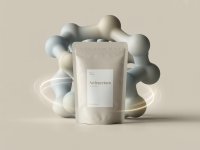
Ashwagandha
Description
Ashwagandha, also known as Indian ginseng or winter cherry, is a revered herb in traditional Ayurvedic medicine. It's primarily known for its adaptogenic properties, helping the body cope with stress and promoting overall well-being. This article provides a comprehensive yet accessible guide to Ashwagandha, covering its benefits, dosage, side effects, and more.
Quick Overview: Ashwagandha At-a-Glance
- Key Benefits: Stress reduction, anxiety relief, improved sleep quality.
- Primary Mechanism: Regulates cortisol levels and influences neurotransmitter activity.
- Best For: Individuals seeking natural stress relief and improved sleep.
- Typical Dose Range: 300-600mg daily, but varies based on desired effect and individual needs.
- Key Caution/Consideration: May interact with certain medications, so consult a healthcare professional.
Table of Contents
Categories & Effectiveness
Learn about our rating methodologyBrain Health
GABA Support
4/10Moderate evidence of effectiveness
Cognition
Memory & Recall
7/10Strong evidence of effectiveness
Mental Acuity
4/10Moderate evidence of effectiveness
Mood & Stress
Cortisol Regulation
10/10Strong evidence of effectiveness
Stress Resilience
10/10Strong evidence of effectiveness
Anxiety Relief
7/10Strong evidence of effectiveness
Wellbeing Boost
7/10Strong evidence of effectiveness
Physical Performance
Physical Endurance
7/10Strong evidence of effectiveness
Strength & Power
4/10Moderate evidence of effectiveness
Sleep Quality
Deeper Sleep Quality
7/10Strong evidence of effectiveness
Faster Sleep Onset
7/10Strong evidence of effectiveness
Dosage & Side Effects
Recommended Dosage
- Typical adult dose: 300-600mg daily.
- Start low: Assess tolerance.
- Consult a professional: Before starting any new supplement regimen.
Potential Side Effects
Bioavailability & Half-Life
Interactions & Stacks
Recommended Products
MAPL Organic Ashwagandha Powder (Indian Ginseng) 7.05 Ounces - Premium Quality, Pure and Natural Ingredients to Support Health
- Rated 4.3 stars by 45 customers
- Premium quality ingredients
Sea Moss Gummies, Sea Moss, Black Seed, Ashwagandha, Turmeric, Manuka Honey, ACV, Dandelion, Black Pepper, Burdock, Bladderwrack, Vegan - 120 Count
- Rated 4.4 stars by 219 customers
- Premium quality ingredients
Sea Moss Liquid Drops Supplement - Black Seed Oil Ashwagandha Burdock Root & Bladderwrack - Silica Multimineral Non-GMO Vegan - 2 Pack
- Rated 4.2 stars by 62 customers
- Premium quality ingredients
As an Amazon Associate we earn from qualifying purchases. Prices and availability are accurate as of the date/time indicated and are subject to change.
Benefits by Use Case
stress reduction
Reduces perceived stress and lowers cortisol levels, promoting a sense of calm. Best results are seen with consistent use over several weeks. However, individual responses can vary.
User Review:
Users report a significant reduction in stress levels after consistent use.
Improved Sleep Quality
Facilitates deeper and more restful sleep, particularly beneficial for individuals with insomnia or sleep disturbances. Effects are often noticeable within a few weeks of regular intake. However, some users report daytime drowsiness.
User Review:
Many users experience improved sleep onset and duration.
Testosterone Boost (Males)
May increase testosterone levels and improve sperm quality in men, potentially enhancing fertility. Requires consistent use over several weeks to months for noticeable effects. However, effects may vary depending on individual health status.
User Review:
Some men report increased libido and improved sexual function.
Cognitive Enhancement
Some research suggests it may improve memory, focus, and cognitive function, particularly in stressed individuals. Benefits may be more pronounced in those experiencing cognitive decline. However, more research is needed to confirm these effects.
User Review:
Users report improved focus and mental clarity with regular use.
Mechanism of Action
Frequently Asked Questions
Where to Buy Ashwagandha
Based on quality, price, and customer reviews, here are our top recommended Ashwagandha supplements:
MAPL Organic Ashwagandha Powder (Indian Ginseng) 7.05 Ounces - Premium Quality, Pure and Natural Ingredients to Support Health
- Rated 4.3 stars by 45 customers
- Premium quality ingredients
Sea Moss Gummies, Sea Moss, Black Seed, Ashwagandha, Turmeric, Manuka Honey, ACV, Dandelion, Black Pepper, Burdock, Bladderwrack, Vegan - 120 Count
- Rated 4.4 stars by 219 customers
- Premium quality ingredients
Sea Moss Liquid Drops Supplement - Black Seed Oil Ashwagandha Burdock Root & Bladderwrack - Silica Multimineral Non-GMO Vegan - 2 Pack
- Rated 4.2 stars by 62 customers
- Premium quality ingredients
As an Amazon Associate we earn from qualifying purchases. Prices and availability are accurate as of the date/time indicated and are subject to change.
Summary & Expert Opinion
For those seeking a deeper understanding, Ashwagandha's effects are multifaceted. Its interaction with the HPA axis is critical, directly impacting cortisol production. Some research also points to its influence on other neurotransmitter systems, including GABA and serotonin, which play key roles in mood regulation. The diverse array of withanolides present in Ashwagandha contribute to its adaptogenic activity, but the specific contribution of each withanolide remains an area of active research.
Nuances in pharmacokinetics require consideration. While the general half-life is estimated to be several hours, individual factors such as liver function and genetics can significantly influence its metabolism and duration of effects. Therefore, responses can vary.
Conflicting study results highlight the importance of methodological rigor. Some studies exhibit limitations such as small sample sizes, heterogeneous designs, and potential for bias. This underscores the need for larger, well-controlled trials to validate Ashwagandha's efficacy and safety.
There is also a lack of long-term human data on Ashwagandha use, particularly at higher doses. While generally considered safe for short-term use, it is crucial to exercise caution and monitor for any adverse effects during prolonged supplementation.
Expert Perspective: While Ashwagandha shows promise as a natural remedy for stress, anxiety, and sleep issues, it is not a "magic bullet". It should be used as part of a holistic approach that includes lifestyle modifications, such as regular exercise, a healthy diet, and stress management techniques. Further research is needed to fully elucidate its mechanisms of action, optimize dosage strategies, and assess its long-term safety profile.







